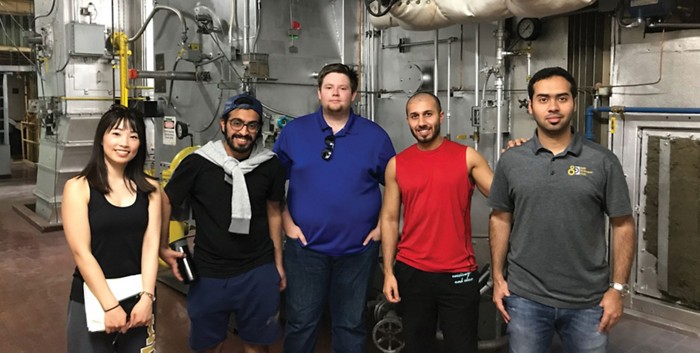Advertisement
Grab your lab coat. Let's get started
Welcome!
Welcome!
Create an account below to get 6 C&EN articles per month, receive newsletters and more - all free.
It seems this is your first time logging in online. Please enter the following information to continue.
As an ACS member you automatically get access to this site. All we need is few more details to create your reading experience.
Not you? Sign in with a different account.
Not you? Sign in with a different account.
ERROR 1
ERROR 1
ERROR 2
ERROR 2
ERROR 2
ERROR 2
ERROR 2
Password and Confirm password must match.
If you have an ACS member number, please enter it here so we can link this account to your membership. (optional)
ERROR 2
ACS values your privacy. By submitting your information, you are gaining access to C&EN and subscribing to our weekly newsletter. We use the information you provide to make your reading experience better, and we will never sell your data to third party members.
Employment
Japan’s chemical industry struggles to find people with science backgrounds, especially bilingual ones
The industry is desperately seeking engineers, data scientists, and anyone who combines technical skills with English fluency
by Katsumori Matsuoka, special to C&EN
August 19, 2018
| A version of this story appeared in
Volume 96, Issue 33

In September 2015, a few months after earning a bachelor’s degree in business management from Tokyo’s Hosei University, Miyako Nakayama began studying for a second bachelor’s degree, this one in mechanical engineering, at the University of Idaho. Her idea was to improve her English while acquiring more technical skills.
It was an unusual move for a person from Japan, where companies typically hire new recruits for career-track positions straight out of college. But Nakayama was not worried. She had already contacted a few Japanese firms, including some from the chemical industry, that approved of her plan.
Nakayama’s studies in Idaho have progressed well. She was the only international student to take part in a university research grant competition, part of the Grand Challenge Scholars Program, winning $2,000 to study the capture of energy from storm winds. Later, she secured another $800 from the university to present her results at the 2nd International Conference on Renewable Energy & Resources on Aug. 27 in Boston.
One reason Nakayama is confident in her plans is that the job market in Japan is red hot for young people who are technically trained and speak English.
In fact, Japanese companies are finding it difficult to find people with technical skills such as engineering, software coding, data mining, and the like, whether they are bilingual or not. Despite its status as a high-tech powerhouse, Japan has failed in recent years to train enough engineers and technicians to meet its needs.
The shortage is especially acute in the manufacturing sector, perceived to be in decline by Japanese youth. The problem shows up in the chemical industry, where companies are struggling to find both young blood and experienced staff.
“We normally hire 40 to 50 R&D scientists, 15 to 20 chemical engineers, and 10 people to work in maintenance, mechanical support, plant construction, and engineering every year,” says Takeshi Nonaka, group leader of human resources at Mitsui Chemicals. “However, year by year, employing engineers for maintenance has been getting harder.”
Finding graduates who can work in plant maintenance is difficult, agrees Yutaka Haruyama, a former executive director of the Japan Chemical Industry Association. Also difficult is securing people who have the skills needed to work with high-tech materials. For example, chemical companies need electrical and electronics engineers to develop materials for electric vehicles.
A lack of employees with the right skills is also keeping Japanese chemical firms from meaningfully exploring research trends common in the industry abroad. “We cannot find graduates familiar with artificial intelligence, big data, or the internet of things,” Mitsui’s Nonaka says.
People with both technical and English-language skills are especially hard to find. As Japanese chemical firms increase their business overseas, they need bilingual technical staffers in their head offices who can interact with customers and communicate with R&D staff abroad.
In many countries, companies faced with such needs would hire staffers away from other firms. But Tom Kiley, associate director responsible for the Japanese chemical sector at the recruitment firm Robert Walters, says competition in Japan is fierce. A competent English-speaking engineer or technician looking to change jobs can typically choose from 10 offers, he says.
Advertisement
Nonetheless, Japanese chemical companies’ use of head-hunting is growing. This is partly due to new business structures that are more customer focused. Whereas employees used to work in product-oriented divisions, companies have reorganized into market-oriented segments with names like automotive, health care, electronics, or energy. Firms are looking for people from the industries they serve.
Working with headhunters is a big change in Japan, where job hoppers are traditionally viewed as unstable or hard to please. Nowadays, “companies don’t care if a talented individual has had two or three jobs earlier on,” Kiley says. Japanese firms are even hiring experienced staffers in their 50s, a practice that was unheard of just a few years ago.
Some companies offer prospective recruits salary increases as high as 30%, even though this can wreak havoc on internal compensation structures. At many Japanese firms, salary levels are strictly based on seniority.
Given the shortage of qualified native employees, Japanese chemical firms are looking at other ways to fill their needs for technical people. Sumitomo Chemical has been hiring science graduates from foreign universities. Of the 140 graduates that the company hired this spring, about a tenth were from China, India, and South Korea.
It’s now policy at Sumitomo to hire 10 to 20 graduates from abroad every year or to hire foreign graduates of Japanese universities. These recruits may work abroad but are treated as career-track staff of the mother company in Japan.
Mitsubishi Chemical also hires fresh graduates from abroad—particularly China, Indonesia, and Singapore—for positions in Japan. In addition, the company is about to launch a scheme in which young recruits from foreign branches of the firm can come to Japan to learn the Japanese language and Japanese business practices for as long as a year, says Masayuki Waga, the company’s president. The idea is that people who go through this program will be able to better interact with the head office after they return to their countries.
Neither head-hunting nor hiring fresh grads from abroad will be enough to fix the Japanese chemical industry’s lack of people who can work with big data or artificial intelligence. According to a recent study by Japan’s Ministry of Economy, Trade & Industry, Japanese industry will be short 50,000 software engineers and technicians by 2020.
The Japan Chemical Industry Association is looking to provide chemists and chemical engineers with new digital skills. The association is working with the Japan Deep Learning Association and the Chemical Society of Japan—Japan’s equivalent to the American Chemical Society—to develop a training curriculum that meets the industry’s needs.
Women are one overlooked source of talent. Manufacturers in Japan typically employ far more men than women, even though many women study engineering and chemistry. Keidanren, a Japanese business association, has been promoting the benefits of gender diversity to its members. But Keidanren itself shows how far Japan has to go in that regard: All the group’s board members are men.
Back in Idaho, Nakayama is scheduled to graduate in December. In recent months, when she searched online for a job in Japan, some firms were inflexible about when they could meet with her. Others insisted that she come to Japan for interviews or told her she was already too old to apply.
But others were far more accommodating. Next April, Nakayama will start working in Japan for Yanmar, a major machinery company. Companies like Yanmar, she believes, were able to look past her unconventional background and see a candidate combining technical skills with unusually broad experience.
“Eight years for two bachelor degrees was a good decision,” she says. “I have no regrets.”
Katsumori Matsuoka has covered the chemical industry for Japan’s Chemical Daily for the past four decades.





Join the conversation
Contact the reporter
Submit a Letter to the Editor for publication
Engage with us on Twitter